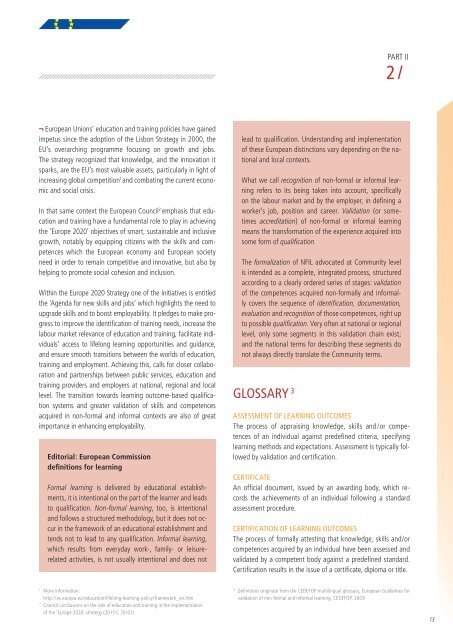RECOGNITION OF NON-FORMAL AND INFORMAL ... - Solidar
RECOGNITION OF NON-FORMAL AND INFORMAL ... - Solidar
RECOGNITION OF NON-FORMAL AND INFORMAL ... - Solidar
Create successful ePaper yourself
Turn your PDF publications into a flip-book with our unique Google optimized e-Paper software.
PART II<br />
2 /<br />
¬ European Unions’ education and training policies have gained<br />
impetus since the adoption of the Lisbon Strategy in 2000, the<br />
EU‘s overarching programme focusing on growth and jobs.<br />
The strategy recognized that knowledge, and the innovation it<br />
sparks, are the EU‘s most valuable assets, particularly in light of<br />
increasing global competition 1 and combating the current economic<br />
and social crisis.<br />
In that same context the European Council 2 emphasis that education<br />
and training have a fundamental role to play in achieving<br />
the ‘Europe 2020’ objectives of smart, sustainable and inclusive<br />
growth, notably by equipping citizens with the skills and competences<br />
which the European economy and European society<br />
need in order to remain competitive and innovative, but also by<br />
helping to promote social cohesion and inclusion.<br />
Within the Europe 2020 Strategy one of the initiatives is entitled<br />
the ‘Agenda for new skills and jobs’ which highlights the need to<br />
upgrade skills and to boost employability. It pledges to make progress<br />
to improve the identifi cation of training needs, increase the<br />
labour market relevance of education and training, facilitate individuals’<br />
access to lifelong learning opportunities and guidance,<br />
and ensure smooth transitions between the worlds of education,<br />
training and employment. Achieving this, calls for closer collaboration<br />
and partnerships between public services, education and<br />
training providers and employers at national, regional and local<br />
level. The transition towards learning outcome-based qualifi cation<br />
systems and greater validation of skills and competences<br />
acquired in non-formal and informal contexts are also of great<br />
importance in enhancing employability.<br />
Editorial: European Commission<br />
definitions for learning<br />
Formal learning is delivered by educational establishments,<br />
it is intentional on the part of the learner and leads<br />
to qualifi cation. Non-formal learning, too, is intentional<br />
and follows a structured methodology, but it does not occur<br />
in the framework of an educational establishment and<br />
tends not to lead to any qualifi cation. Informal learning,<br />
which results from everyday work-, family- or leisurerelated<br />
activities, is not usually intentional and does not<br />
lead to qualifi cation. Understanding and implementation<br />
of these European distinctions vary depending on the national<br />
and local contexts.<br />
What we call recognition of non-formal or informal learning<br />
refers to its being taken into account, specifi cally<br />
on the labour market and by the employer, in defi ning a<br />
worker’s job, position and career. Validation (or sometimes<br />
accreditation) of non-formal or informal learning<br />
means the transformation of the experience acquired into<br />
some form of qualifi cation<br />
The formalization of NFIL advocated at Community level<br />
is intended as a complete, integrated process, structured<br />
according to a clearly ordered series of stages: validation<br />
of the competences acquired non-formally and informally<br />
covers the sequence of identifi cation, documentation,<br />
evaluation and recognition of those competences, right up<br />
to possible qualifi cation. Very often at national or regional<br />
level, only some segments in this validation chain exist;<br />
and the national terms for describing these segments do<br />
not always directly translate the Community terms.<br />
GLOSSARY 3<br />
ASSESSMENT <strong>OF</strong> LEARNING OUTCOMES<br />
The process of appraising knowledge, skills and / or competences<br />
of an individual against predefi ned criteria, specifying<br />
learning methods and expectations. Assessment is typically followed<br />
by validation and certifi cation.<br />
CERTIFICATE<br />
An offi cial document, issued by an awarding body, which records<br />
the achievements of an individual following a standard<br />
assessment procedure.<br />
CERTIFICATION <strong>OF</strong> LEARNING OUTCOMES<br />
The process of formally attesting that knowledge, skills and/or<br />
competences acquired by an individual have been assessed and<br />
validated by a competent body against a predefi ned standard.<br />
Certifi cation results in the issue of a certifi cate, diploma or title.<br />
1<br />
More information:<br />
http://ec.europa.eu/education/lifelong-learning-policy/framework_en.htm<br />
2<br />
Council conclusions on the role of education and training in the implementation<br />
of the ‘Europe 2020’ strategy (2011/C 70/01)<br />
3<br />
Defi nitions originate from the CEDEFOP multilingual glossary, European Guidelines for<br />
validation of non-formal and informal learning, CEDEFOP, 2009<br />
13
















